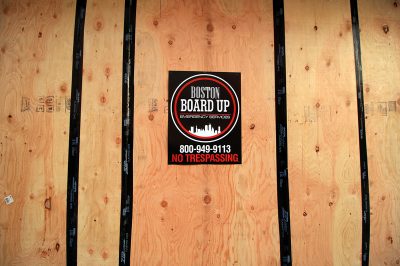Businesses across Boston had boarded up their properties before Election Day in anticipation of property damage in case of civil unrest. Now that the week has passed without incident, this wooden boarding can be reused to reduce its environmental impact.

Louis Falzarano, owner of Boston Board Up Emergency Services, said some customers chose to board up their businesses before the election, despite Falzarano advising them it was unnecessary.
“This is just a sad situation that people feel the need to do it,” Falzarano said. “The climate is such that it is that people have to spend money protecting their places.”
Falzarano said this year was the first time he has received requests to board up businesses in preparation for an election.
Some businesses chose to board up after they were looted earlier in the year, Falzarano said, when protests left the city’s storefronts shattered and shops broken into.
Although some clients had scheduled board removals for Thursday, Falzarano said these businesses ultimately chose to delay the removals. They would call him, he said, when they felt ready to de-board.
Falzarano said his company removes boarding for some customers, while others choose to remove it themselves.
Boarding can be reused multiple times, depending on its exposure to the weather, he said. Boston Board Up tries to reuse its plywood as much as possible to lessen environmental impacts, Falzarano added.
Jonathan Krones, an assistant environmental studies professor at Boston College, said because plywood is cheap, businesses may have less of an economic incentive to reuse it.
However, doing so can help clients save money, Falzarano said. Storing boards on their own property allows businesses to use them again if needed, without having to pay for new wood in the future.
Krones said the boarding-up of businesses caused a short-term increase in the consumption of plywood, which takes a toll on trees.
Although plywood comes largely from farmed forests, he said, the creation of plywood also entails the use of chemicals.
Plywood can be used to produce wood chips or be burned for energy, depending on a state’s laws, Krones said.
He said he does not recommend using a plywood alternative for boarding, because he would rather things not escalate to the point where businesses would feel the need to look for a more durable version of protection.
“I would just as well have the businesses use plywood which could be used one or two times, and then that’d be the end of it,” Krones said, “rather than have somebody manufacture a synthetic or something out of metal or plastic.”
Because such materials are more long-lasting, Krones said producing them imposes a larger environmental impact.
“I personally don’t spend too much time worrying about the environmental impacts of [plywood],” Krones said, “because of the hope that this is the last time we’re going to have to board up our windows for a very long time.”






















































































































